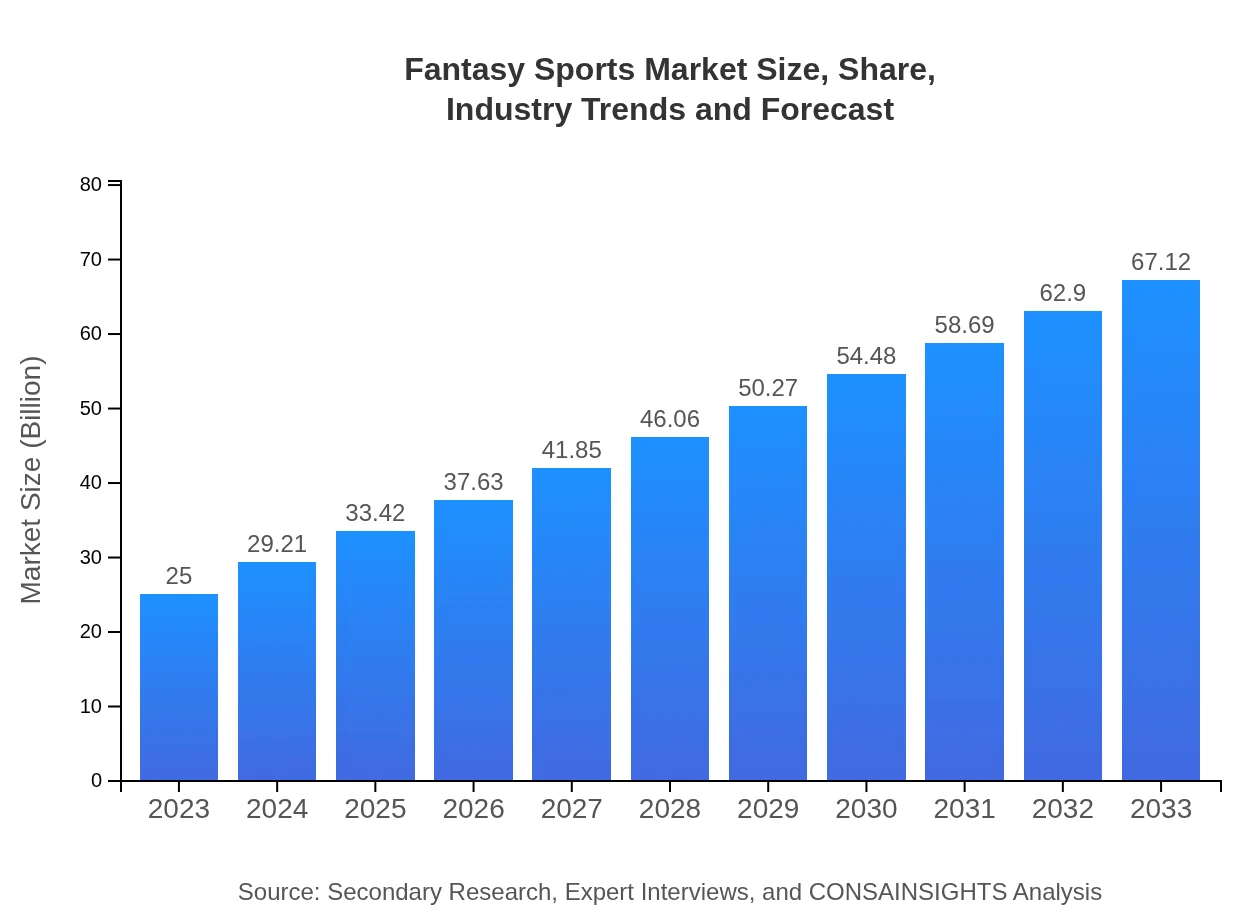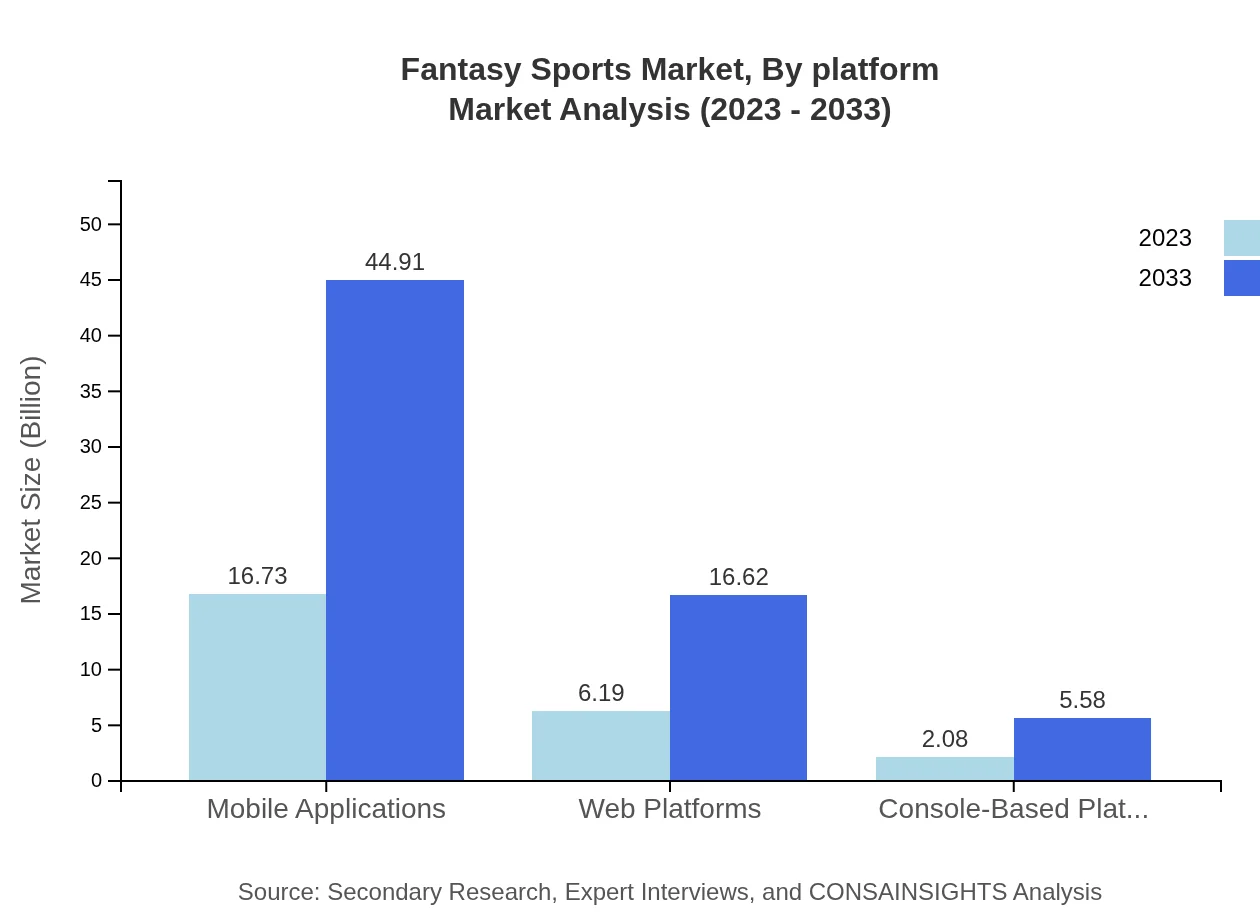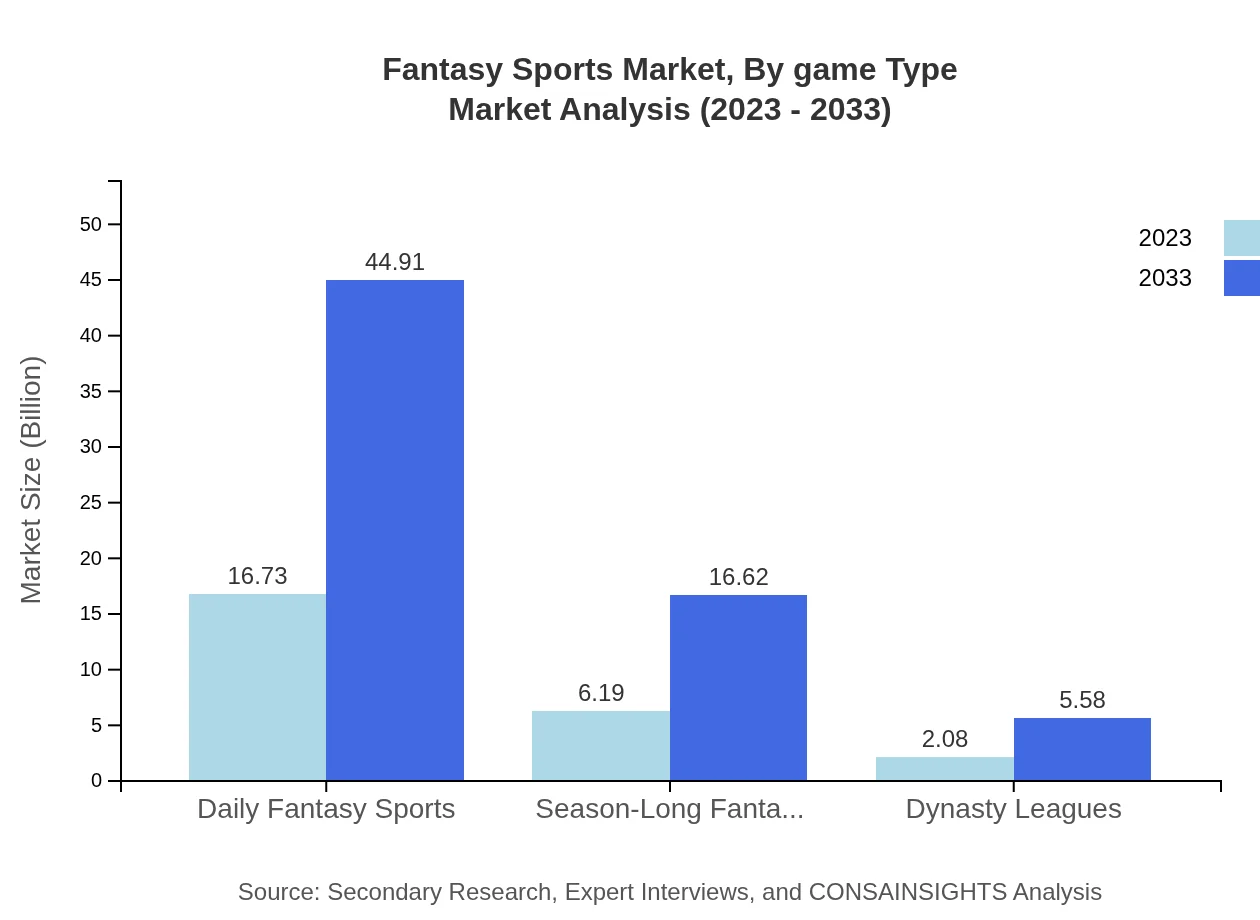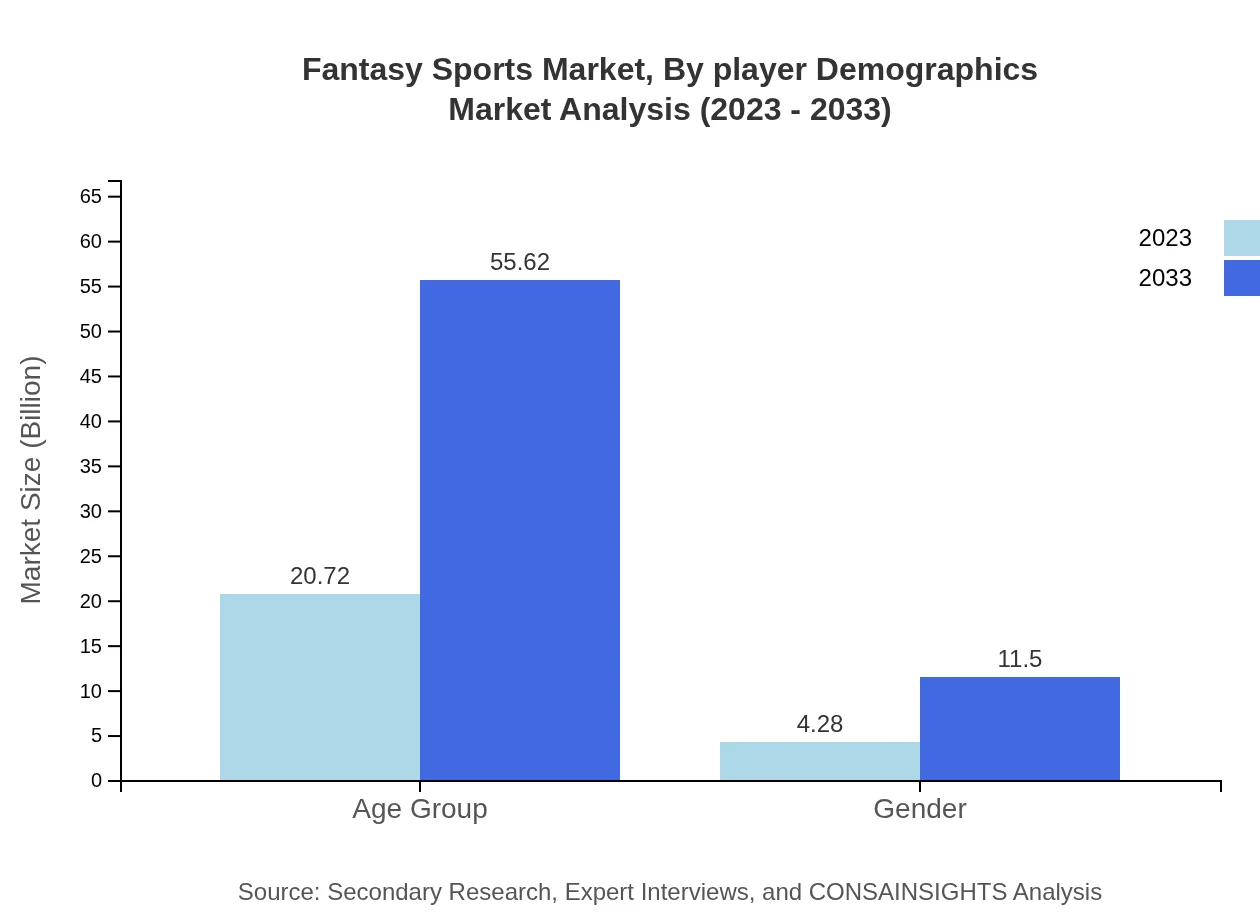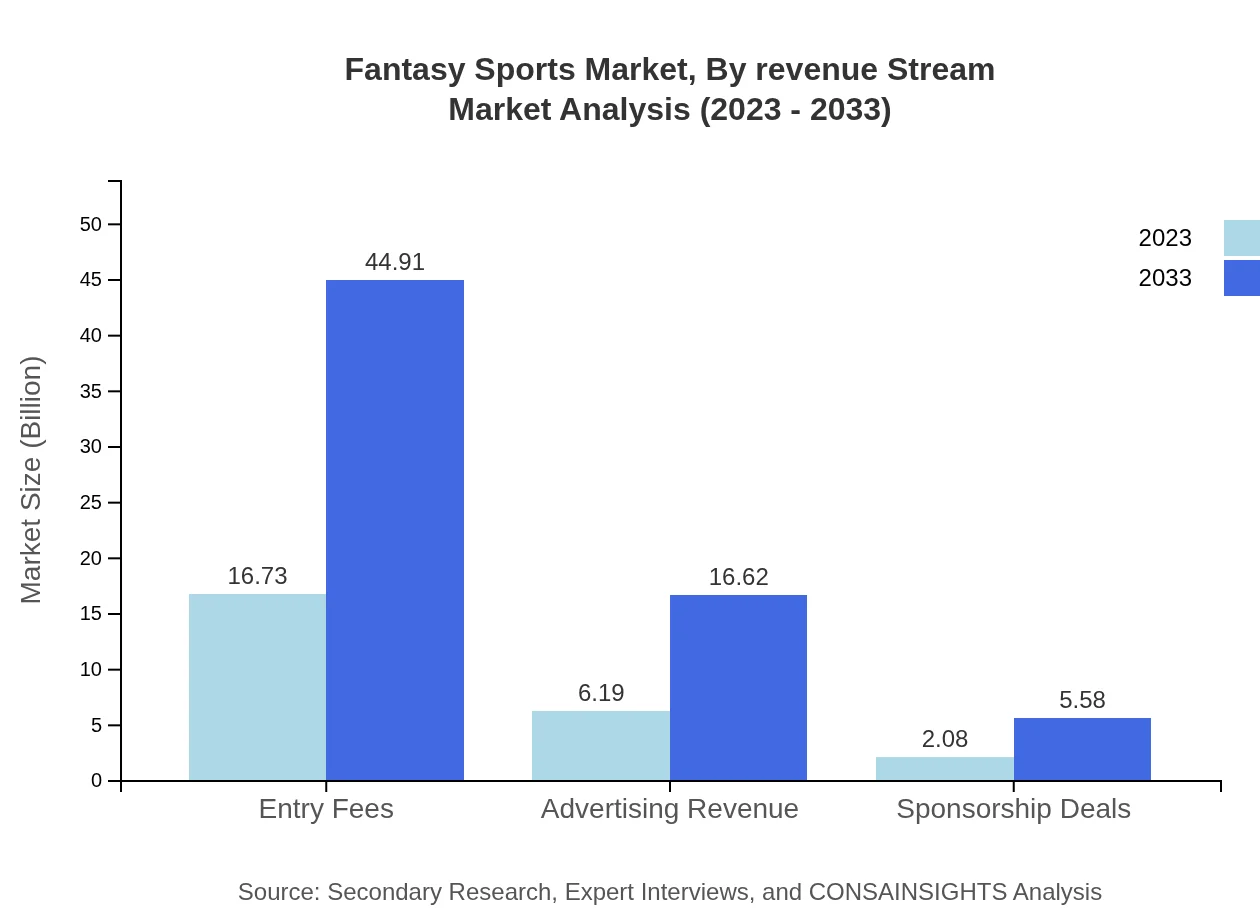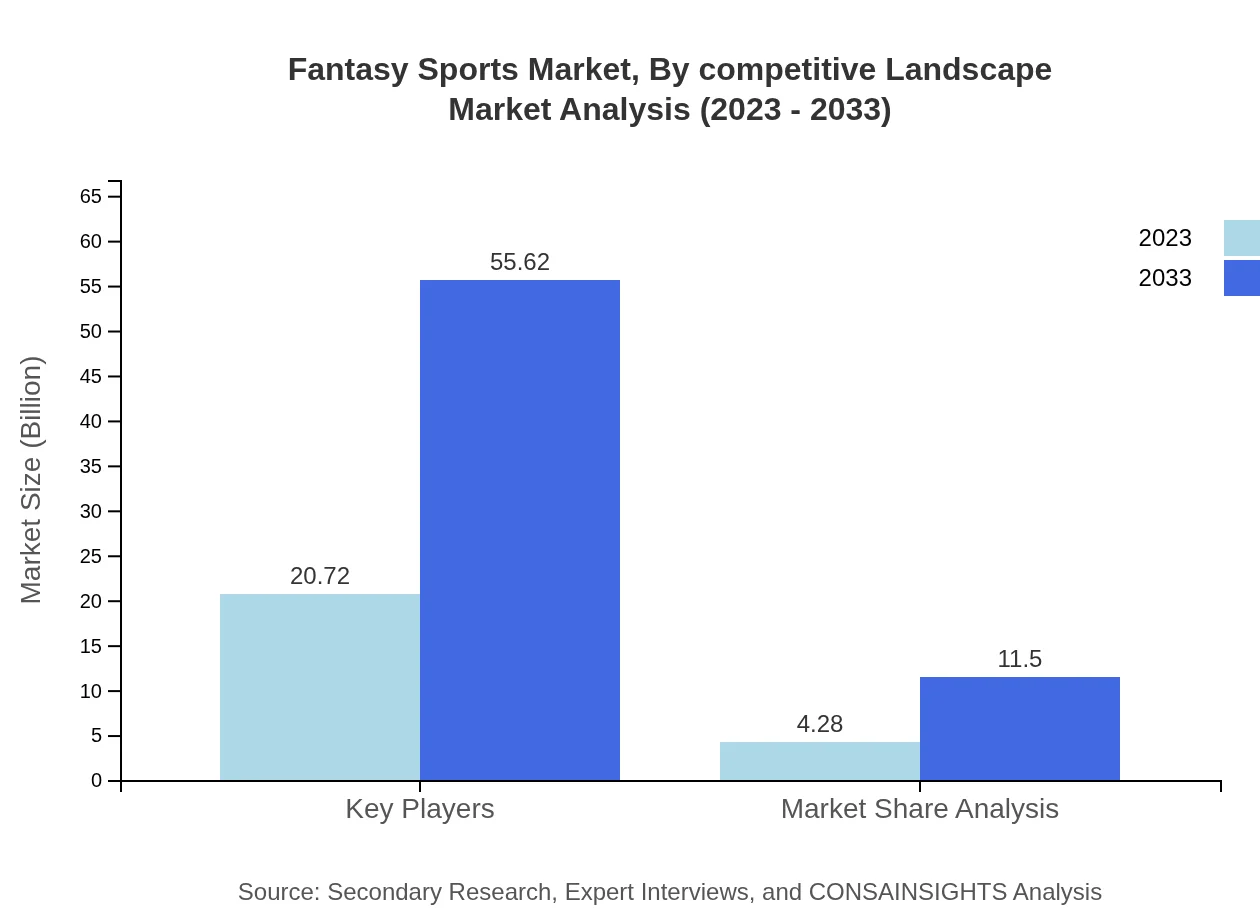Fantasy Sports Market Report
Published Date: 31 January 2026 | Report Code: fantasy-sports
Fantasy Sports Market Size, Share, Industry Trends and Forecast to 2033
This report provides a comprehensive analysis of the Fantasy Sports market, covering insights and data from 2023 to 2033. It includes market size projections, key trends, industry analysis, regional breakdowns, and competitive landscapes.
| Metric | Value |
|---|---|
| Study Period | 2023 - 2033 |
| 2023 Market Size | $25.00 Billion |
| CAGR (2023-2033) | 10% |
| 2033 Market Size | $67.12 Billion |
| Top Companies | DraftKings, FanDuel, Yahoo Fantasy Sports, ESPN Fantasy Sports |
| Last Modified Date | 31 January 2026 |
Fantasy Sports Market Overview
Customize Fantasy Sports Market Report market research report
- ✔ Get in-depth analysis of Fantasy Sports market size, growth, and forecasts.
- ✔ Understand Fantasy Sports's regional dynamics and industry-specific trends.
- ✔ Identify potential applications, end-user demand, and growth segments in Fantasy Sports
What is the Market Size & CAGR of Fantasy Sports market in 2023?
Fantasy Sports Industry Analysis
Fantasy Sports Market Segmentation and Scope
Tell us your focus area and get a customized research report.
Fantasy Sports Market Analysis Report by Region
Europe Fantasy Sports Market Report:
The European Fantasy Sports market, valued at USD 6.16 billion in 2023, is expected to reach USD 16.54 billion by 2033. With a diverse sports culture and strong participation rates in fantasy leagues, particularly for football, the market is poised for steady growth fueled by increasing digital engagement.Asia Pacific Fantasy Sports Market Report:
The Asia Pacific region is witnessing rapid growth in the Fantasy Sports market, anticipated to expand from USD 5.34 billion in 2023 to USD 14.34 billion by 2033. This growth is driven by increasing internet penetration, smartphone usage, and the popularity of sports like cricket and football, leading to heightened interest in fantasy sports leagues.North America Fantasy Sports Market Report:
North America is the largest market for Fantasy Sports, projected to increase from USD 9.63 billion in 2023 to USD 25.85 billion by 2033. This robust growth is attributed to the established popularity of fantasy leagues, particularly in football and basketball, alongside a conducive regulatory environment and strong technological infrastructure.South America Fantasy Sports Market Report:
In South America, the Fantasy Sports market is expected to grow from USD 0.93 billion in 2023 to USD 2.50 billion by 2033. The market is currently in an emerging phase, largely influenced by the popularity of football in the region, presenting significant potential for expansion as digital engagement rises.Middle East & Africa Fantasy Sports Market Report:
In the Middle East and Africa, the Fantasy Sports market is forecasted to grow from USD 2.93 billion in 2023 to USD 7.87 billion by 2033. The market is largely driven by the rising youth demographic, growing smartphone penetration, and increasing interest in sports such as football and cricket.Tell us your focus area and get a customized research report.
Fantasy Sports Market Analysis By Platform
In 2023, mobile applications lead the Fantasy Sports market with a size of USD 16.73 billion, expected to grow to USD 44.91 billion by 2033, maintaining a 66.91% market share. Web platforms follow, starting at USD 6.19 billion and projecting to reach USD 16.62 billion, holding a 24.77% share. Console-based platforms contribute USD 2.08 billion in 2023, with an expected growth to USD 5.58 billion.
Fantasy Sports Market Analysis By Game Type
Daily Fantasy Sports (DFS) segments dominate the market at USD 16.73 billion in 2023 and are expected to grow to USD 44.91 billion by 2033, accounting for the largest share alongside season-long leagues that begin at USD 6.19 billion and reach USD 16.62 billion. Dynasty leagues account for a smaller segment, starting from USD 2.08 billion and rising to USD 5.58 billion.
Fantasy Sports Market Analysis By Player Demographics
Demographically, players aged 18-34 are predominant in the Fantasy Sports market, starting from USD 20.72 billion in 2023, projected to expand to USD 55.62 billion by 2033, capturing 82.87% of the share. The market segment for genders accounts for USD 4.28 billion with expectations to grow to USD 11.50 billion.
Fantasy Sports Market Analysis By Revenue Stream
Revenue streams in Fantasy Sports are primarily from entry fees, which start at USD 16.73 billion in 2023 and are projected to reach USD 44.91 billion by 2033, maintaining a 66.91% share. Advertising revenues are expected to grow from USD 6.19 billion to USD 16.62 billion, while sponsorship deals increase from USD 2.08 billion to USD 5.58 billion.
Fantasy Sports Market Analysis By Competitive Landscape
The competitive landscape of Fantasy Sports is marked by the presence of several key players. Their strategies involve enhancing user engagement through innovative features and robust marketing campaigns. Market dynamics reveal a trend towards vertical integration, where platforms seek to create end-to-end user experiences.
Fantasy Sports Market Trends and Future Forecast
Tell us your focus area and get a customized research report.
Global Market Leaders and Top Companies in Fantasy Sports Industry
DraftKings:
A leader in the daily fantasy sports segment, DraftKings offers users a dynamic platform with real-time sports statistics and user-friendly interfaces, significantly contributing to market growth.FanDuel:
FanDuel is a key player in the fantasy sports industry, known for its user engagement strategies and innovative offerings, focusing heavily on daily fantasy sports competitions.Yahoo Fantasy Sports:
A traditional player in the fantasy space, Yahoo has diversified its offerings, integrating fantasy sports into its broader sports news and analysis platform.ESPN Fantasy Sports:
ESPN has leveraged its sports branding to build a significant fantasy sports platform, attracting a large user base and creating synergies with its various media properties.We're grateful to work with incredible clients.









FAQs
What is the market size of Fantasy Sports?
The fantasy sports market is projected to grow from $25 billion in 2023 to an estimated size of $66.91 billion by 2033, with a compound annual growth rate (CAGR) of 10%.
What are the key market players or companies in the Fantasy Sports industry?
Key players in the fantasy sports market include leading platforms and established firms that drive user engagement and revenue, highlighted by their significant shares in market segments like Mobile Apps and Daily Fantasy Sports.
What are the primary factors driving the growth in the Fantasy Sports industry?
Market growth is driven by increasing smartphone adoption, engaging user experiences, a surge in online gaming popularity, and the rise of esports, significantly influencing the user base and market revenues.
Which region is the fastest Growing in the Fantasy Sports market?
The fastest-growing region in fantasy sports is North America, with market projections increasing from $9.63 billion in 2023 to $25.85 billion in 2033. Europe follows closely, showcasing robust development in user participation.
Does ConsaInsights provide customized market report data for the Fantasy Sports industry?
Yes, ConsaInsights offers tailored market research reports, allowing businesses to explore specific segments of the fantasy sports industry based on unique needs and objectives, providing actionable insights.
What deliverables can I expect from this Fantasy Sports market research project?
Deliverables include comprehensive market analysis reports, competitive landscape evaluations, growth forecasts, regional insights, and segmentation data, all providing a thorough understanding of the current and future market dynamics.
What are the market trends of Fantasy Sports?
The fantasy sports market is trending towards mobile application dominance, increased user engagement via daily fantasy sports formats, and diversified revenue streams from advertisements and sponsorships, reflecting rising player interests.

